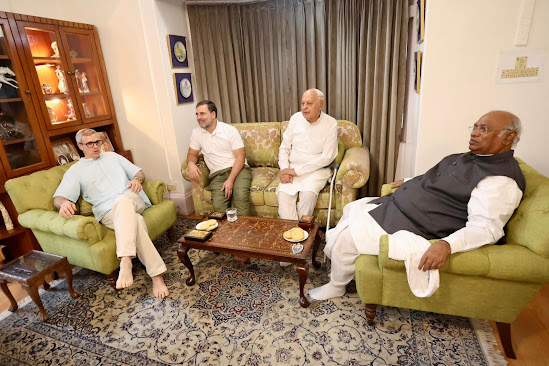Jammu and Kashmir Elections: Why pre-poll alliance between National Conference and Congress has sparked political discourse? What BJP said
In a significant development, National Conference (NC) President Dr. Farooq Abdullah expressed optimism about the newly formed pre-poll alliance between the NC and Congress. After a meeting with Congress leader Rahul Gandhi and Congress President Mallikarjun Kharge on Thursday evening, Dr. Abdullah remarked to reporters, "If God wishes, our alliance with Congress will work well. We are on the right track."
This alliance, announced during the visit of Rahul Gandhi and Mallikarjun Kharge to Jammu and Kashmir, has sparked considerable political discourse. The meeting, held at Dr. Farooq Abdullah’s Gupkar residence in Srinagar, was attended by key leaders including former CM Omar Abdullah.
Dr. Abdullah revealed to the media that the pre-poll alliance is set to cover all 90 seats in Jammu and Kashmir. This strategic partnership aims to consolidate their position in the region, but it has also drawn reactions from political rivals.
Shah questions Cong's stance on reservation policies
Union Home Minister Amit Shah was quick to criticize the alliance, particularly on the issue of reservation. In a pointed tweet, Shah questioned the Congress's stance on reservation policies in the context of the National Conference's manifesto. He highlighted the Modi government's efforts to provide reservations for Dalits, tribals, and other marginalized communities after the abrogation of Articles 370 and 35A. Shah challenged Rahul Gandhi to clarify his position on what Shah referred to as an "anti-reservation proposal" by the JKNC that could impact Dalits, Gujjars, Bakarwals, and Paharis.
Dr. Rafi Kidwai, a BJP leader, said the party is unafraid of the alliance and confident in their electoral prospects. He pointed out that similar alliances have occurred in the past, with mixed results. He urged the Congress Party and Rahul Gandhi to clarify their stance on reservation policies to the public.
Despite the alliance, the Jammu and Kashmir BJP remains unfazed, asserting that this partnership will not impact their electoral strategy. The BJP's confidence stems from their belief that the alliance may struggle with internal challenges, particularly in determining a seat-sharing formula.
Alliance could prevent a split in Muslim votes in Jammu
Political analysts view the National Conference's decision to ally with Congress as a calculated move. This partnership could potentially prevent a split in the Muslim votes in Jammu, which would be advantageous to both parties. Additionally, the alliance poses a new challenge to the BJP, particularly in Jammu and Kashmir, where it signals a united front of major political forces against them.
Alliance could face hurdles in the future
However, observers caution that the alliance may face hurdles in the future. The National Conference has a stronghold in the Kashmir Valley, while Congress is expected to perform well in the Jammu region. This regional strength could complicate the process of negotiating a fair seat-sharing agreement.
The stakes are particularly high in the Jammu region, where there are around 11 seats where the Muslim vote could be pivotal. Despite the potential benefits of the alliance, victory is far from assured. Both the PDP and the BJP are formidable opponents, and the alliance may face stiff competition.
Why didn’t PDP and NC form an alliance
One key question remains: why didn’t the PDP and National Conference form an alliance? The answer lies in their history as fierce rivals. This rivalry has prevented them from uniting, even during the recent Lok Sabha elections. Additionally, the PDP is currently experiencing internal turmoil, with many senior leaders leaving the party following the abrogation of Article 370. In this context, the National Conference’s decision to ally with Congress appears to be a strategic, albeit risky, move aimed at bolstering their electoral prospects.
The alliance between the National Conference and Congress is a significant development in the political landscape of Jammu and Kashmir, but its success will depend on overcoming internal challenges and navigating the complexities of regional politics.

